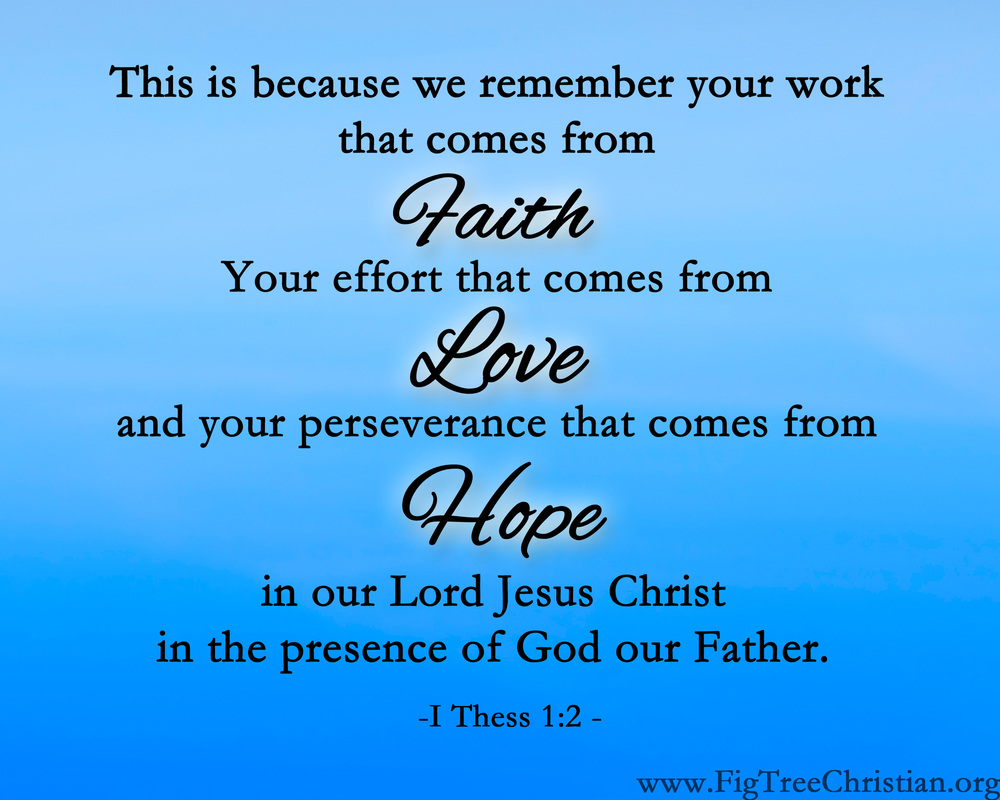|
1 Thessalonians 1:1-10 CEB From Paul, Silvanus, and Timothy. To the Thessalonians’ church that is in God the Father and the Lord Jesus Christ. Grace and peace to all of you. We always thank God for all of you when we mention you constantly in our prayers. This is because we remember your work that comes from faith, your effort that comes from love, and your perseverance that comes from hope in our Lord Jesus Christ in the presence of our God and Father. Brothers and sisters, you are loved by God, and we know that he has chosen you. We know this because our good news didn’t come to you just in speech but also with power and the Holy Spirit and with deep conviction. You know as well as we do what kind of people we were when we were with you, which was for your sake. You became imitators of us and of the Lord when you accepted the message that came from the Holy Spirit with joy in spite of great suffering. As a result you became an example to all the believers in Macedonia and Achaia. The message about the Lord rang out from you, not only in Macedonia and Achaia but in every place. The news about your faithfulness to God has spread so that we don’t even need to mention it. People tell us about what sort of welcome we had from you and how you turned to God from idols. As a result, you are serving the living and true God, and you are waiting for his Son from heaven. His Son is Jesus, who is the one he raised from the dead and who is the one who will rescue us from the coming wrath. Of all the letters written by Paul, no two letters are written exactly the same, because no two communities were exactly alike. This becomes a good thing for us because we gain from the diverse insights Paul shares with multiple communities. As Paul gets the chance to explain multiple theological issues, we are the winners. Now, a little bit about Thessalonica. If you wanted to visit this city today, well you are in luck! It is the only Pauline city still in existence and going by its original name! However, if you are an archeologist you are really out of luck. Because a bustling city actually exists on top of the former ancient city, it is near to impossible to find ancient ruins of the original Thessalonica. It means we cannot know certain aspects of how this city lived when Paul wrote 1 and 2 Thessalonians. We cannot base our knowledge on pot shards or ancient murals, because they just don't exist anymore. There are a few things we can know based on writings at the time. First, it was the largest city in Macedonia. They had 200,000 residents at the time of the letters. We know Paul frequented the area because he also preached to another Macedonian city: Philippi. Now, here is the usual order of things when Paul visits a city:
This is not the case for Thessalonica. Paul comes and shares the word which is embraced by the people. Just like every other place he would visit, all was going well when something happened. Apparently there was a group in Thessalonica that did not like Paul's message. They could have sent him death threats, they could have told him he would be jailed. We are not sure. We are sure whatever happened was enough to get Paul to leave quickly without saying goodbye. Now, the people who had embraced Paul's message in Thessalonica were confused. Had they done something wrong? Why did Paul leave so quickly? They decided to find out and sent messengers to find Paul and ask what they did wrong. (In many ways this is the perfect setup for a comedic movie, right? Comedic movies always start out where everything is absolutely perfect and then some unforeseen event happens which throw all those involved into hijinks. If this wasn't a life or death matter, it could be humorous.) When word finally reaches Paul he is astounded. First of all, he doesn't think they have done anything wrong in the least. They embraced the message and things were going well. So instead of chastising the people, part of the reason he drafts 1 Thessalonians is to clear the air and explain what really happened. Secondly, they ended up finding him in Corinth. You might remember Corinth, it is the place I directly related to Las Vegas: the crazy place where anything goes. I bet he was thinking very fondly of Thessalonica while trying to work with the Corinthians. You know, it might have been fortuitous the Thessalonians found Paul in Corinth. Something ended up coming out of 1 Thessalonians we often attribute to 1 Corinthians. Maybe Corinth inspired his writing 1 Thessalonians or maybe Thessalonica was in his memory while drafting 1 Corinthians, we cannot know. But, for the first time, before 1 Corinthians was ever penned, Paul tells the Thessalonians about faith, hope, and love. Now, to be clear, in 1 Thessalonians the concept is slightly more vague than it became in 1 Corinthians 13, but it is there. Just to remind you, here it is again as Paul wrote it: We always give thanks to God for all of you and mention you in our prayers, constantly remembering before our God and Father your work of faith and labor of love and steadfastness of hope in our Lord Jesus Christ. Let’s delve into that, shall we? I submit this early version of faith, hope, and love can be viewed in a temporal, or time related way. Faith, hope and love can become a way we can be Christians who live for the past, the future, and the present. More importantly than ever it is something we need to be aware of. Work of faith: eventually every past event will need to be taken on faith. History truly becomes history when there are no physical people to vouch for the actions written on paper, or to explain the relics left behind. At that point we must have faith in what is being taught to us whether it is the bible, the family tree, or U.S. History. In many ways what we do in life is dictated by what we learn from our past. Science is pushed forward by the theories and works of previous scientists. We can keep from repeating the mistakes of our ancestors or learn from their accomplishments by recalling their story. However, we cannot simply live in faith. As Christians, simply having faith in God through recollection will only keep us in the past. We need to look towards the future. Steadfastness of hope: if we cannot hope for something than what do we have to live for? Hope is a positive outlook towards what will be. We have hope in Jesus Christ as Lord and Savior and what that will mean when we finally pass on. We live in that anticipation and our actions can lead us towards that future goal. Hoping for the future, in general, can lead to innovation and a better life for our children's children. But, by itself it is empty because reason to hope comes from faith in what has been. It makes me think of Camping and his various apocalyptic predictions. He is that guy who made an apocalyptic prediction back in May based on calculations using the bible. It didn't happen in the 90's and it didn't happen this past May. It will not happen this month as he had changed the prediction to. Living only in hope, whether that hope is for an end times in our lifetime or a utopia on earth, without history (aka faith) to back it than it is not a worthwhile endeavor. So what ties these two things together? Labor of love: Bringing faith and hope, past and future, together is work. Labor is a beautiful word to describe it. In childbirth the parents are the past, the child is the future and labor is what brings it all to fruition. Love is something that happens now. Love lives in the present. Love, more than faith and hope, takes work because it brings about the finished product. Our faith and hope in Christ are only the tools to live out love. I believe this idea can be expanded by looking at the concluding verse of 1 Cor 13. After all, Corinth could have had an impact on what Paul said to Thessalonicia or visa versa. “Faith, hope, and love abide these three, but the greatest of these is love.” Have faith in what you learn, study and pray. Have hope in what is yet to come. And, go out, with faith and hope to live the gospel in love.
|
Categories
All
Archives
October 2023
|





 RSS Feed
RSS Feed